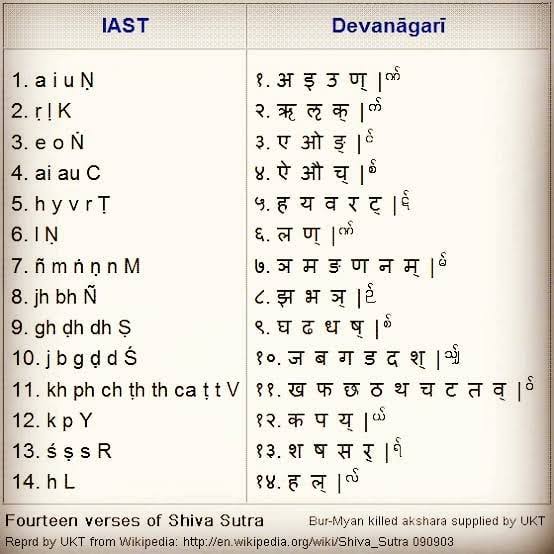Sanskrit, The superior language
Maharishi Panini was a genius who complied rules of sanskrit Grammar in shortest possible form in his text "Ashtadhyayi" a book of 8 chapters. There are thousands of Sutras in Ashtadhyayi and not even a single letter is extra.
Maharishi Panini was a genius who complied rules of sanskrit Grammar in shortest possible form in his text "Ashtadhyayi" a book of 8 chapters. There are thousands of Sutras in Ashtadhyayi and not even a single letter is extra.
First thing is the use of Shiva sutras, these are 14 sutras and they greatly reduce the size of this text. Let me show how
For example some rule applies on these letters-
अ, इ, उ,ऋ, ऌ,ए,ओ,ऐ,औ
And Some other rule applies to these letters-
अ, इ, उ, ऋ, ऌ ,ए, ओ, ऐ, औ, ह, य, व ,र
For example some rule applies on these letters-
अ, इ, उ,ऋ, ऌ,ए,ओ,ऐ,औ
And Some other rule applies to these letters-
अ, इ, उ, ऋ, ऌ ,ए, ओ, ऐ, औ, ह, य, व ,र
if we write all these letters again and again it will take up too much space, so to reduce it I can use Shiva Sutras
So for first example I can say अच् and it will mean (अ, इ,उ,ऋ,ऌ,ए,ओ,ऐ,औ ) all these letters
So for first example I can say अच् and it will mean (अ, इ,उ,ऋ,ऌ,ए,ओ,ऐ,औ ) all these letters
For second one I can simply write अट् and it will mean (अ,इ,उ, ऋ, ऌ , ए , ओ, ऐ, औ, ह, य, व ,र )
See how precise these Sutras are, it is unimaginable how someone can formulate these Sutras and arrange letters them in such a way so that rules of grammar can be described,
See how precise these Sutras are, it is unimaginable how someone can formulate these Sutras and arrange letters them in such a way so that rules of grammar can be described,
It will require high level intellect to create them and to also use them to create rules of Grammar.
Panini& #39;s Ashtadhyayi describe Grammar just like computer programming, let me show with an example-
Panini& #39;s Ashtadhyayi describe Grammar just like computer programming, let me show with an example-
I want to use a word in present, tense third person, singular which means "he is reading".
How can I make such word?
First Panini says - all entities starting from Bhu are called Dhatus.
(Dhatus are word roots from which word is formed)
How can I make such word?
First Panini says - all entities starting from Bhu are called Dhatus.
(Dhatus are word roots from which word is formed)
So to make a word I will have to choose a Dhatu which means "read" I chose पठँ dhatu
1. पठँ will become पठ्
2. In present tense लट् will be the suffix
पठ् + लट्
3. लट् will lose its ट्
पठ् + लट् = पठ् + ल्
1. पठँ will become पठ्
2. In present tense लट् will be the suffix
पठ् + लट्
3. लट् will lose its ट्
पठ् + लट् = पठ् + ल्
4. तिङ् Suffix will replace ल्
(तिङ् Suffixes are defined by Panini these suffix tell wether word is in First person,third person etc or the word is in singular, plural or dual)
(तिङ् Suffixes are defined by Panini these suffix tell wether word is in First person,third person etc or the word is in singular, plural or dual)
5. As we want a word in singular third person we will add तिप् Suffix (first one of तिङ्) in place of ल्
पठ्+ल् = पठ् + तिप्
पठ्+ल् = पठ् + तिप्
6 Another sutra says शप् must be added in between these two hence it becomes
पठ् + शप् + तिप्
7. Then it is defined that प् of latter both and श् gets hidden so it becomes
पठ् + अ + ति = पठति
पठ् + शप् + तिप्
7. Then it is defined that प् of latter both and श् gets hidden so it becomes
पठ् + अ + ति = पठति
So now I got my word, if I have to say "he reads" I can say "सः पठति"
Hence 1 word पठति is formed after so many steps and each and every step is well defined, I didn& #39;t conver many details here.
Works like a computer program, millions of words can be made like this.
Hence 1 word पठति is formed after so many steps and each and every step is well defined, I didn& #39;t conver many details here.
Works like a computer program, millions of words can be made like this.
Now which other language in world has such a detailed grammar? Can anybody tell why english words are used the way they are used? No
Sanskrit is a superior language, for people with high intellect, each and every word has a meaning,
Sanskrit is a superior language, for people with high intellect, each and every word has a meaning,
Not like other languages where meaning of word is dependent on usage.
Sanskrit is Most logical, superior and best language for communication that can ever exist.
That& #39;s why its called Deva Bhasha, language of Devas.
Sanskrit is Most logical, superior and best language for communication that can ever exist.
That& #39;s why its called Deva Bhasha, language of Devas.

 Read on Twitter
Read on Twitter




